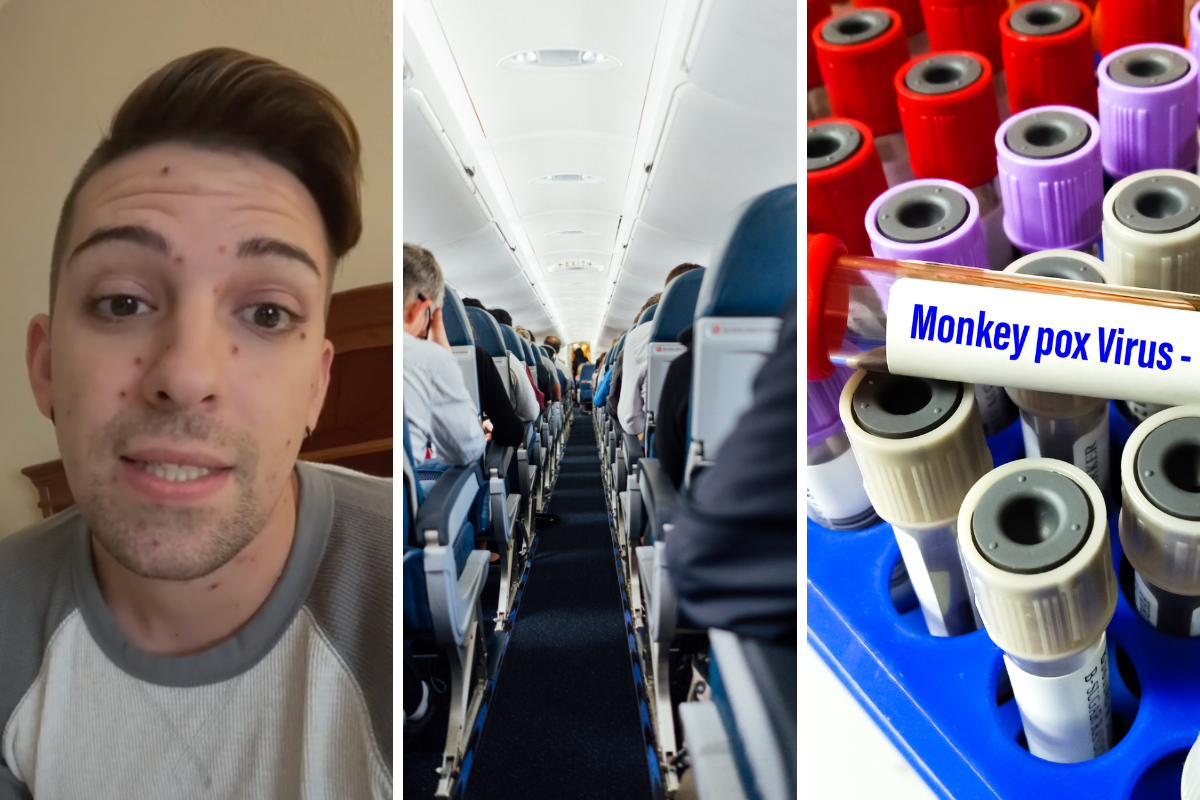
A U.S.-based flight attendant who has been forced into quarantine after being diagnosed with Monkeypox in the middle of a three-day trip in Florida says he believes he was infected by a passenger or another crew member onboard a plane.
The flight attendant, who works for an unidentified airline, says he developed tell-tale lesions on his chest which prompted him to make a visit to the hospital. He then quarantined in his hotel but only received test results that confirmed he had Monkeypox after five days.
@ava__monet Monkey pox as a working flight attendant #monkeypox #flightattendant #hotel #fyp #letsgoinsane
♬ original sound – Ava Monet Josh Jones
In a viral TikTok video that has already been viewed more than 1.3 million times, the flight attendant who goes by the name Josh said: “I was on a three-day trip, the second day of the trip I noticed I had a couple of bumps when I landed here in Fort Lauderdale”.
“So I went to the ER to get checked out and they did all the tests. They swabbed all the bumps that were on my chest, they did urine work, blood work and sent me back to my hotel”.
“The test finally came back today, which is the fifth day, so I’ll be here for the next three weeks. As of right now, I am I think the first (flight attendant), in my company to get it while on a trip,” Josh continued.
@ava__monet Day 6 with monkey pox #flightattendant #monkeypox #fyp
♬ original sound – Ava Monet Josh Jones
In a follow-up post, Josh described some of the other symptoms he had been experiencing including headaches, night sweats and joint pain that he describes as “excruciating”.
Answering comments from followers, Josh said that he knows he “got it on the plane, or at a dirty hotel, or another crew member may have had it and come in contact with me”.
“Skin-to-skin contact is number one with this; if someone has lesions, another one is spit particles, ingesting someone’s spit particles. It’s what happens; we’re in a tube all day”.
In the current global Monkeypox outbreak, the majority of infections have occurred amongst men who have sex with men but Monkeypox is not a sexually transmitted infection and anyone is at risk. Josh says he hasn’t had sexual contact with anyone recently and that he “lives to work”.
Josh will be stuck in his hotel room for 21 days on the advice of his doctors, although the Centers for Disease Control and Prevention (CDC) suggests anyone diagnosed with Monkeypox only needs to isolate until all symptoms have resolved and the rash has healed and a new layer of skin has formed.
Monkeypox is not easily spread and it generally requires close, personal and often skin-to-skin contact. The CDC has not raised any specific concerns for flight attendants or airline passengers.
However, the UK’s Health Security Agency (UKHSA) published a document that classified different exposure risks for various settings. The UKHSA assessment is that sitting next to someone with Monkeypox on a plane would put someone at ‘medium risk’ of being infected.
Symptoms of Monkeypox include fever and headache, aching muscles, chills and exhaustion, a sore throat or cough and swollen lymph nodes. A tell-tale rash can appear after several days on the face, chest, hands or mouth, as well as around the anus and genitals.
Monkeypox generally lasts two to four weeks and is normally self-limiting. As well as close contact with someone who is infected, the virus can be spread by touching objects or fabrics that were recently used by someone with Monkeypox, as well as via respiratory secretions.
The incubation period is between 5 and 21 days.
A spokesperson for the International Air Transport Association (IATA), a global trade organization for the airline industry, declined to comment on the specifics of this case but stated that inflight transmission was not “plausible”.
In a statement, IATA told us: “As Monkeypox appears to require close contact to spread, and does not spread by aerosol or by proximity of individuals, transmission to nearby airline passengers is not considered a likely or even plausible mechanism of spread.”
The seven largest airlines in the United States were contacted and asked if they wanted to comment on this incident.
Mateusz Maszczynski honed his skills as an international flight attendant at the most prominent airline in the Middle East and has been flying ever since... most recently for a well known European airline. Matt is passionate about the aviation industry and has become an expert in passenger experience and human-centric stories. Always keeping an ear close to the ground, Matt's industry insights, analysis and news coverage is frequently relied upon by some of the biggest names in journalism.








The immaculate transmission…
In other news, I had a patient come into the ED having “fallen onto a shampoo bottle” while in the shower.
Oh…..I’ll bet I know how he got it.
Just a coincidence that it’s a gay dude
Not surprising that the young gentleman is blaming in-cabin contact or the hotel. And while crew hotels are hit or miss, there is no mention of his activities prior his awareness of the infection. If it takes five to 21 days to incubate, how can he be so absolutely sure that it was through those venues and not personal behavior?